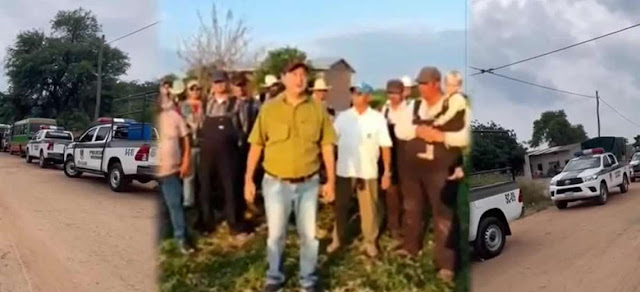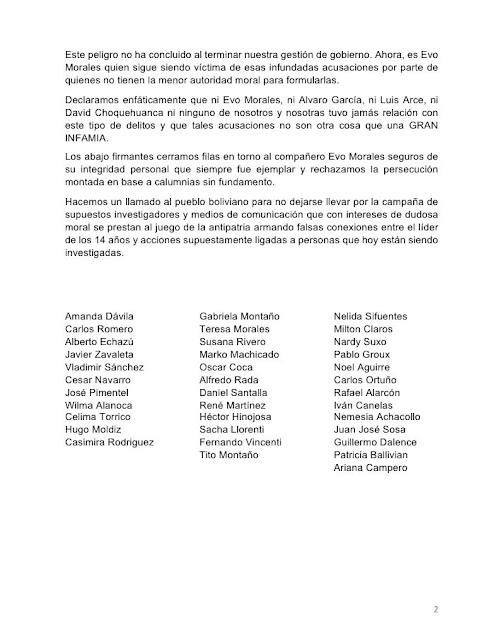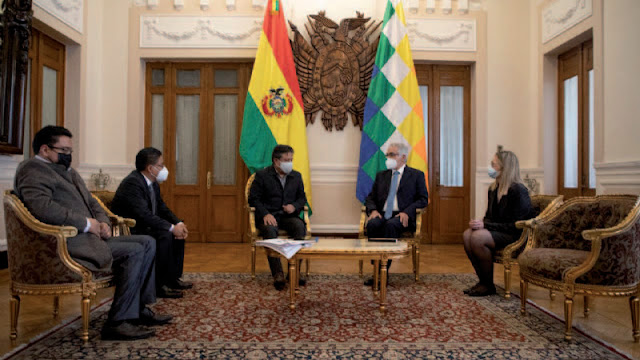Relatives of policemen, wives of military and civic members of Potosí demonstrated. The Vice President, the Chancellor and the Minister of Justice met with him, as well as the Group of Independent Jurists and Conade.
A procession of complaints against injustice received yesterday the special rapporteur of the United Nations (UN) on the Independence of Judges and Lawyers, Diego García-Sayán, who will be in Bolivia until the 22nd.
Police family members, as well as military and civic wives of Potosí held a vigil in the South zone, in the vicinity of the offices of the international organization, demanding justice and freedom. They indicated that the police family, the military and the people of Potosí, among other sectors, are "the real victims".
Guadalupe Cárdenas, who leads the police wives, was also in the group. She presented a letter addressed to García-Sayán, to whom she pointed out "serious injustices" against police officers, "who were unjustly dismissed due to processes rigged by the government in power".
Lieutenant Franklin Mamani Guarachi also sent a letter to the Rapporteur, in which he indicates that he is "unjustly" deprived of liberty. "I am a political prisoner, persecuted and victim of the dictatorship in Bolivia," he said in the letter.
The Independent Jurists Group and the National Committee for the Defense of Democracy (Conade) met with García-Sayán and presented him with documentation on the lack of judicial independence.
Opponents, such as Creemos Senator Centa Rek, criticized the Movimiento Al Socialismo (MAS) for excluding them from the meetings that two Senate commissions have scheduled for today with García-Sayán.
A brief chronicle
With a salute to the cameras, with his right hand and without giving statements to the press, García-Sayán began his agenda in Bolivia. This happened before entering a meeting with Foreign Minister Rogelio Mayta, scheduled for 9:00.
The meeting with the Minister of Foreign Affairs lasted approximately one hour. Afterwards, he went to the Vice-Presidency, where he held a meeting with the second in command of the country, David Choquehuanca. The meeting was also attended by the Minister of Justice, Iván Lima.
At approximately 3:00 p.m. he met with the Independent Jurists Group and at 7:00 p.m. with Conade leaders. These last two meetings were held in the facilities of the international organization in the country.
Reports and letters
The former mayor and lawyer Juan Del Granado, representing the legal advisors, said that they delivered to the Rapporteur a dossier, in which they show that justice was subordinated to the three recent periods of government: to the current government of Luis Arce and to the administrations of Evo Morales and Jeanine Añez.
"We have been able to convey to the rapporteur the serious difficulties that our administration of justice is going through, with emphasis on the lack of independence (...). We have given him a complete dossier on the situation of judicial independence," he said.
For its part, Conade gave the UN rapporteur documentation showing that the justice system acted favorably in processes involving members of the MAS.
"We have exposed the lack of judicial independence, we exposed the most emblematic cases: from Tipnis, Fondioc, to cases of political persecution. We presented a registry of a list of judges who are linked to processes where the norms have not been complied with and the MAS was favored", indicated the representative of Conade, Lizeth Veramendi.
The head of the Creemos senators' bench, Centa Rek, and the Comunidad Ciudadana legislator Andrea Barrientos denounced that the opposition members of the Senate Constitution and Justice Commissions were not notified about today's meeting with García-Sayán. "This makes us see that in reality the agenda of the Rapporteur is being managed, trying to make only the official voices heard," he indicated.
Meeting and observations
García-Sayán is scheduled to have a meeting today with the presidents of the Senate and Deputies, Andrónico Rodríguez and Freddy Mamani.
"We are agreeing to the rapporteur's request (to meet) with the two presidents of both chambers," said Mamani.
Movimiento Al Socialismo senator Virginia Velasco confirmed that the Justice Commission will have a meeting with the rapporteur this Wednesday.
Guadalupe Cárdenas, during the demonstration held in the vicinity of the UN offices, said: "We have presented the letters (to meet with García-Sayán), so that everyone knows about the political persecutions".
Meetings to be confirmed
The opposition benches of Comunidad Ciudadana and Creemos requested a meeting with the UN representative. Date and time have not yet been confirmed.
Former President Añez requested that he visit her in the Miraflores prison to explain her situation. "They have not yet confirmed the visit", explained Carolina Ribera, daughter of the ex-president.
Sources close to Añez's defense indicated that if the meeting is confirmed, it could take place during the weekend.
The leader of the Central Obrera Boliviana, Nicanor Baltazar, opened the possibility that the union also requests a meeting with García-Sayán, although he expressed that he "does not have much confidence" in the Rapporteur, because he was minister of his country, for which he expects him to be impartial.









